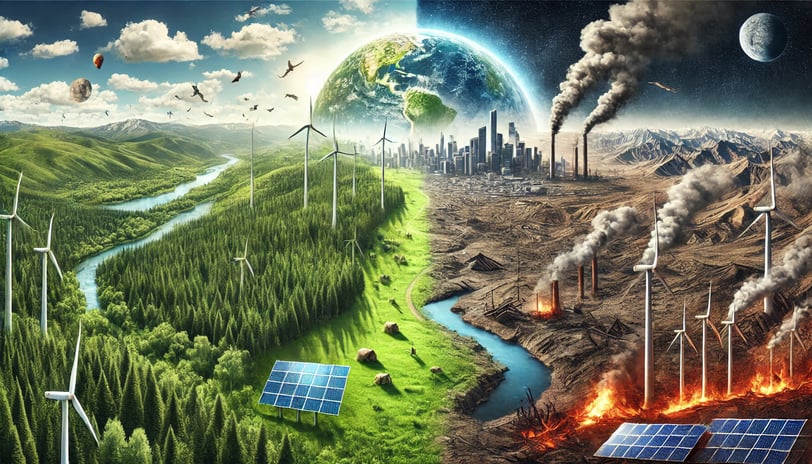The Recent Rise in Global Temperatures: Causes, Consequences, and Solutions
The Earth's temperature has been rising at an alarming rate in recent decades, with 2023 and 2024 marking some of the hottest years on record. Scientists attribute this increase primarily to human activities, particularly the burning of fossil fuels, deforestation, and industrial pollution. While some debate the severity and causes of global warming, its effects are becoming increasingly evident worldwide.
2/13/20252 min read


Causes of Rising Temperatures
Several factors contribute to the rising global temperature, but the most significant include:
Greenhouse Gas Emissions: The burning of coal, oil, and natural gas releases large amounts of carbon dioxide (CO₂) and methane (CH₄) into the atmosphere, trapping heat and causing the planet to warm.
Deforestation: The removal of forests reduces the planet’s ability to absorb CO₂, exacerbating the greenhouse effect.
Industrial and Agricultural Activities: Factories, livestock farming, and large-scale agriculture contribute to greenhouse gas emissions, including methane from cattle and nitrous oxide from fertilizers.
Urbanization: Expanding cities and infrastructure absorb more heat, creating localized warming effects known as urban heat islands.
Consequences of Global Warming
The impacts of rising temperatures are already visible and are expected to worsen if no significant action is taken:
Extreme Weather Events: Increased frequency and intensity of hurricanes, wildfires, heatwaves, and droughts.
Rising Sea Levels: Melting ice caps and glaciers contribute to rising ocean levels, threatening coastal cities and island nations.
Loss of Biodiversity: Many species struggle to adapt to changing temperatures, leading to habitat loss and extinction.
Health Risks: Rising temperatures contribute to heat-related illnesses, increased spread of infectious diseases, and worsening air quality.
Economic Disruptions: Damage to infrastructure, agriculture, and water supplies leads to financial losses and food insecurity.
Differing Perspectives on Climate Change
Not everyone agrees on the causes, severity, or necessary responses to climate change. Perspectives vary widely based on scientific research, political ideologies, and economic interests:
Scientific Consensus: The vast majority of climate scientists agree that human activities are the primary driver of global warming and urge immediate action.
Political and Economic Views: Some industries and governments are reluctant to transition away from fossil fuels due to economic concerns, job losses, and infrastructure costs.
Climate Skeptics: A minority argues that climate change is part of Earth's natural cycles or that its effects are overstated.
Activists and Environmentalists: Groups such as the United Nations, the IPCC, and grassroots organizations advocate for urgent measures to reduce carbon emissions and protect the planet.
What Can Be Done?
While the challenge is significant, several strategies can help mitigate climate change:
Transition to Renewable Energy: Increasing the use of solar, wind, and hydroelectric power reduces reliance on fossil fuels.
Energy Efficiency: Implementing sustainable practices in industries, transportation, and households can significantly cut emissions.
Reforestation and Conservation: Protecting and restoring forests enhances carbon absorption.
Government Policies and International Agreements: Regulations, carbon taxes, and agreements like the Paris Climate Accord aim to curb emissions globally.
Personal Actions: Reducing energy consumption, using public transportation, recycling, and supporting eco-friendly initiatives contribute to the collective effort.
Conclusion
The rising global temperature presents one of the greatest challenges of our time, with consequences that impact ecosystems, human health, and economies. While debates continue, the overwhelming scientific consensus highlights the urgent need for action. By adopting sustainable practices, supporting clean energy, and promoting international cooperation, humanity can work toward mitigating climate change and ensuring a livable planet for future generations.
Explore
Discover diverse topics in one convenient hub.
Connect
Learn
contact@mindstormblog.com
© 2025. All rights reserved.

